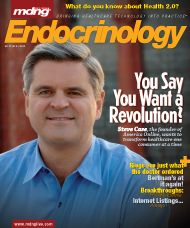Publication
Article
MDNG Endocrinology
5 Questions... with Matthew Holt, Health 2.0 Conference Founder
Matthew Holt is a ubiquitous presence in the online world of Health 2.0. He is the proprietor of The Health Care Blog, essential reading that promises to tell you "everything you always wanted to know about the health care system.
Matthew Holt is a ubiquitous presence in the online world of Health 2.0. He is the proprietor of The Health Care Blog, essential reading that promises to tell you “everything you always wanted to know about the health care system. But were afraid to ask;” he is an in-demand healthcare strategist, consultant, and speaker; and he is one of the organizers of the Health 2.0 — User-generated Healthcare Conference. We spoke with him about the ideas underlying Health 2.0 and where he sees this movement continuing.
1 How do you define Health 2.0?
My simple definition is that Health 2.0 is the use of Web 2.0 technologies in healthcare. Typically, Web 2.0 technologies include blogs, wikis, discussion and community sites, and those that make it very easy for technology users, rather than publishers, to generate content and share it with each other.
2 How are Health 2.0 applications currently being used in healthcare?
There’s a fantastic patient community called PatientsLikeMe, where patients keep a kind of diary that’s like an electronic medical record for themselves, including detailed information about what is going on in their lives and all they are doing to cope with their diseases. A huge amount of information gets shared. Th ere have been online communities in diff erent formats since the early ‘90s, and now Health 2.0 off ers tools and technologies that make it easier to use them. By using forums like PatientsLikeMe and with the increased ability to search these forums, people can fi nd useful information more easily. Usually, a doctor sees a patient, sees what their symptoms are, and usually has one to three diagnoses in their mind at the time. But many times, there is a wrong diagnosis or incomplete diagnosis, or there is a rare disease that is showing up like a more common disease. Th e impact of the ability to search into other people’s experiences and match with cases online in these communities is going to be substantial. A doctor may see one or two of these cases in a lifetime, but there may be 20 or 30 or 1,000 of these people, and if you can put them all together in one group, it makes the information much easier to find.
3 How long will the Health 2.0 movement continue?
I would argue that the incorporation of these applications into all kinds of business and activity online is going to keep going, because it’s another wave of technology. People are not going to stop caring about their patient community or their disease. Companies are going to fi gure out what tools and technologies people are fi nding useful and adapt their business processes accordingly. In healthcare, there’s also non-commercial interest, so things will be supported by foundations and patient groups, with or without the actual success of individual Health 2.0-type companies. Even if Revolution Health or PatientsLikeMe goes away, I think these tools will continue to be used, both by healthcare organizations as part of their Web eff orts, and by nonprofit groups and patient communities.
4 What are your views on Revolution Health?
I like RevolutionHealth.com as a website. I think they’re trying to do basically everything across the board in terms of Health 2.0, putting together all these diff erent tools for consumers to use to interact with each other around their health. I think they’ve done quite a nice job. But the problem with Revolution Health is if you call yourself “Revolution” and you start off by making a huge splash, you’re going to be disappointed whatever you do. So, I think if you ignore what Steve Case said when he started it and ignore the name, it’s a nice website. It’s building traffic—mostly by acquisition—and they’ve now got a lot of good pieces in place and some traction in terms of the market place. The problem from a business perspective is, if you start off spending a huge amount of money the way they did, and take on huge numbers of people, it’s very hard to understand how they are going to make a huge amount of money doing it. But time will tell on that one. It took WebMD a long time to fi gure out their business, but they are doing well these days.
5 Do you see a lot of misconceptions regarding Health 2.0?
I think any time you’re talking about something as complicated and with as many vested interests as the healthcare system, saying that we’re going to change the healthcare system using Health 2.0 is over-ambitious. Some people are at the risk of grafting other things like the concept of transparency of data too. Health 2.0 is going to help with that, but it’s not going to completely force that on the market. I think if you say Health 2.0 is going to change healthcare as we know it in every aspect and immediately, you’re going to be disappointed. But if you say we expect to see Health 2.0 adopted by more and more patients, physicians, and healthcare organizations, I’d agree; I’m sure it could slowly change the way healthcare is delivered and the way people manage their health.





